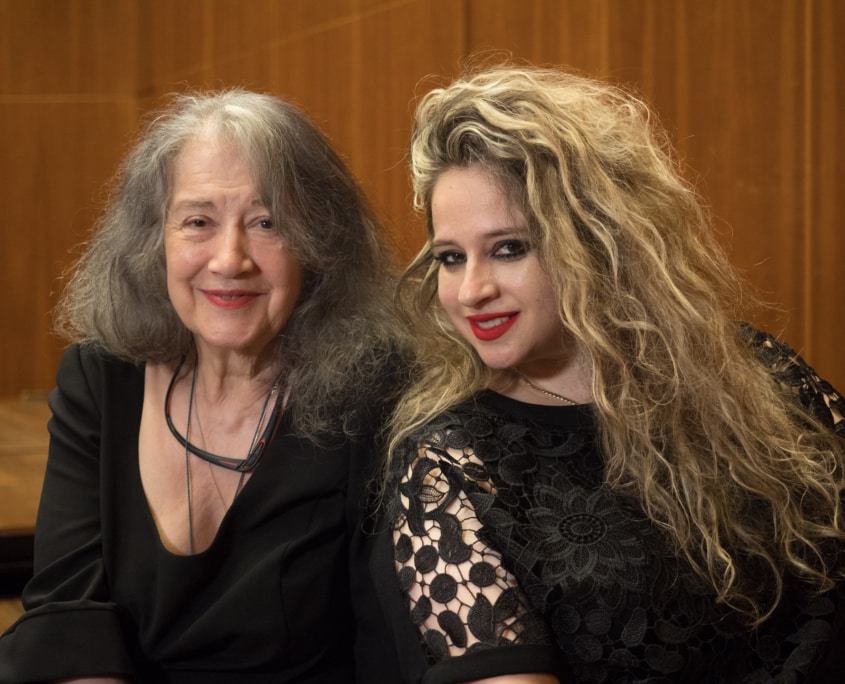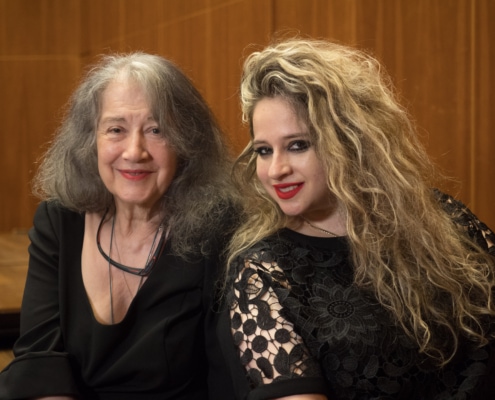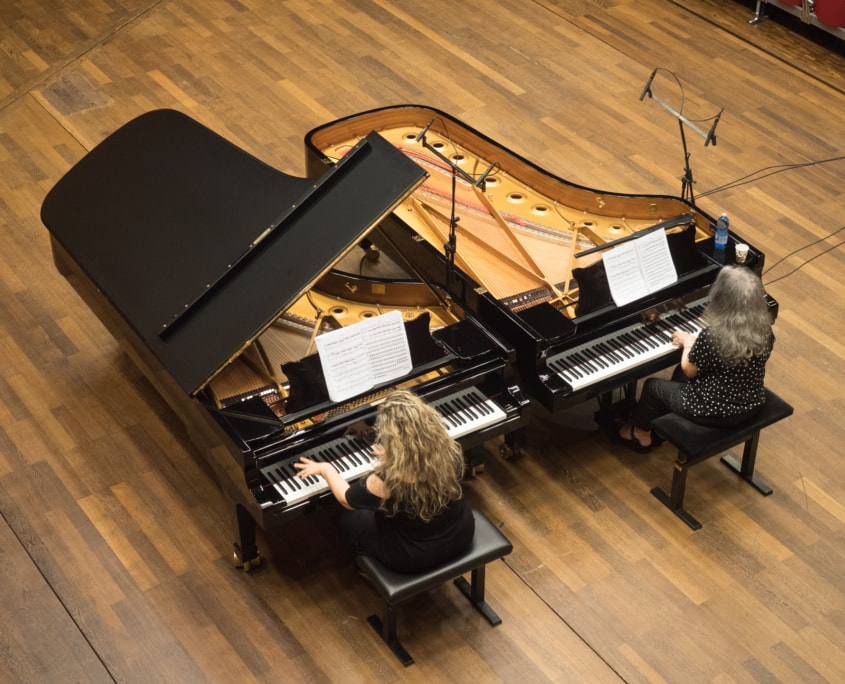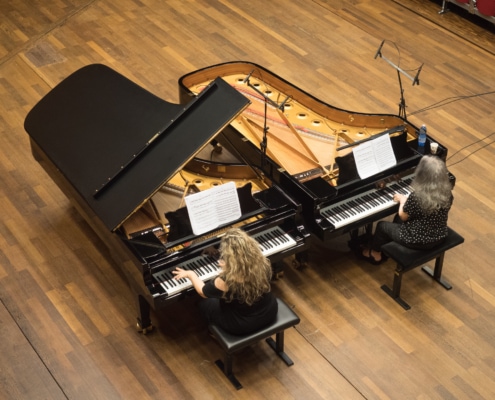Theodosia Ntokou: «Cultura e Arte sono strumenti potenti e pilastri per le nostre economie.»
Anche se solo virtualmente incontriamo Theodosia Ntokou, pianista capace di coniugare in sé insegnamenti cosmopoliti con la profonda amicizia che la lega a Martha Argerich, sua mentore con la quale ha recentemente inciso per la Warner Classics la sinfonia n. 6 “Pastorale” di Beethoven nella versione per due pianoforti di Selmar Bagge.
- Sei nata a Rodi; quanta parte della tua terra c’è nella tua visione della musica?
Sono nata a Rodi, un’isola nell’angolo sud-est della Grecia. Il sole, il mare e l’atmosfera positiva e splendente dell’isola, hanno segnato la mia psicologia e personalità. È un privilegio guardare l’orizzonte ogni mattina all’alba e ogni pomeriggio al tramonto con i suoi molteplici colori e immaginare che questi colori si colleghino alla musica.
Tutte queste immagini, esperienze e sentimenti mi hanno decisamente ispirato e hanno svolto un ruolo importante nello scolpire la mia personalità e il mio carattere come musica e come essere umano.
- La tua educazione è meravigliosamente cosmopolita. È difficile combinare i diversi insegnamenti che hai avuto in molti paesi diversi?
Sono stato molto privilegiata, per via del mio lavoro, nel poter viaggiare molto e di avere familiarità con molte diverse varietà di culture, stili di vita, persone e costumi. Alla fine, il linguaggio della musica è uno e non è imbrigliato da confini, riunisce persone e società sotto un’unica lingua e anima.
- Venendo al cd, perché la tua scelta è caduta sulla versione di Bagge che, in un certo modo, reinterpreta Beethoven attraverso gli occhi del Romanticismo?
Durante il XIX secolo, il pubblico ha sperimentato la grande letteratura sinfonica, arrangiata per pianoforte nei salotti. Questo spiega la quantità di così tante trascrizioni. Ci sono arrangiamenti per la sesta di Beethoven di Franz Ludwig Schubert e Theodor Kirchner, di Carl Czerny, Franz Liszt, Wilhelm Meves e di Selmar Bagge.
Abbiamo deciso con Martha prima della nostra registrazione, e dopo aver controllato le altre versioni della “Pastorale” , che quella di Bagge era la migliore versione scritta per pianoforte.
- Essere amica, lavorare e collaborare con Martha Argerich deve essere incredibilmente stimolante e allo stesso tempo tremendamente impegnativo. Finché la conosco, credo che si aspetti standard molto alti ma che sia anche molto generosa. Sbaglio?
Ci sono così tante straordinarie qualità da ammirare in Martha Argerich, a parte il fatto che è la regina del pianoforte. Una musicista impeccabile e fantastica, una personalità straordinaria. La sua semplicità come essere umano, il suo umorismo e la comunicazione e il supporto senza sforzo che dà non solo a me ma a tutti i suoi amici, è qualcosa di così speciale e unico. È un onore immenso e una benedizione di Dio. Mi considero molto fortunata perché ho potuto conoscere la persona dietro il Nome.
- Come stai vivendo questo momento di emergenza planetaria che ha momentaneamente cancellato la musica dal vivo e il contatto con il pubblico?
Anche se c’è una contraddizione tra l’immagine dell’artista che ha bisogno di isolamento per poter esprimere la sua Arte, tuttavia c’è anche il fatto che l’artista ha bisogno del suo pubblico. La situazione emersa dalla pandemia di Covid-19 ha sicuramente sollevato problemi globali e lotte nella funzione sociale della cultura. Cultura e Arte sono strumenti potenti e pilastri per le nostre economie. La cultura è il fondamento delle nostre Società e un processo di umanizzazione, con poteri riparatori per contribuire alla psicologia fisica e mentale delle persone. Vivo a Berlino ma ho deciso di passare il lockdown a Rodi con la mia famiglia. Speriamo tutti che le cose tornino presto alla normalità e non avremo una crisi di proporzioni catastrofiche in futuro a causa del Covid-19.
Alessandro Cammarano
English version
Even if only virtually we meet Theodosia Ntokou, a pianist capable of combining cosmopolitan teachings with the deep friendship that binds her to Martha Argerich, her mentor with whom she recently recorded for Warner Classics Beethoven’s symphony n. 6 “Pastoral” in the version for two pianos by Selmar Bagge.
- You were born in Rhodes; how much of your land is there in your vision of music?
I was born in Rhodes, an island in the southeast corner of Greece. The sun, the sea and the positive and shining atmosphere of the island, have marked my psychology and personality. It is a privilege to watch the horizon every morning in its sunrise and every afternoon in its sunset with its multiple colors and imagine that these colors connect to the music.
All these images, experiences and feelings definitely inspired me and played an important role in sculpting my personality and character as a music and as a human being.
- Your education is wonderfully cosmopolitan. Is it difficult to combine the different teachings you had in plenty of different countries?
I have been very privileged, due to my line of work, to have travelled extensively and to be familiar with many different variety of cultures, way of life, people and customs. In the end, the language of Music is one and it isn’t barricaded by borders, it brings people and societies together under one common language and soul.
- Coming to the cd, why has your choice fallen on the version of Bagge who, in a certain way, reinterprets Beethoven through the eyes of Romanticism?
During the 19th century, audiences experienced the great symphonic literature, arranged for piano in salons. That explains the amount of so many transcriptions. There are arrangements for Beethoven’s Sixth by Franz Ludwig Schubert and Theodor Kirchner, by Carl Czerny, Franz Liszt, Wilhelm Meves and by Selmar Bagge.
We have decided with Martha before our recording, and after checking the other versions of the Pastorale Symphony, that the Bagge was the better written version for piano.
- Being a friend, working and collaborating with Martha Argerich must be incredibly stimulating and at the same time tremendously challenging. As long as I know her, I believe that she expects very high standards but that she is also very generous. I am wrong?
There are so many extraordinary qualities to admire in Martha Argerich except for the fact that she is the Queen of the piano. A flawless and fantastic musician. An extraordinary personality. Her simplicity as a human being, her humor, and the effortless communication and support that she gives not only to me but to all her friends, is something so special and unique. It is the biggest honour and it is a blessing from God. I consider myself very lucky as I got to know the person behind the Name.
- How are you experiencing this moment of planetary emergency that has momentarily canceled live music and contact with the public?
Even if there is a contradiction between the image of the artist that needs to have isolation in order to express his Art, then there is also the fact that the artist needs its audience. The situation that has been surfaced through the Covid-19 pandemic, definitely has raised global issues and struggles in the social function of culture. The importance of Culture and Art is a powerful tool and a pillar for our economies. Culture is the foundation of our Societies and a process of humanization, with restorative powers to contribute to physical and mental psychology of the people. I live in Berlin but I decided to spend the lockdowns in Rhodes with my family. We all hope that things will be back to normality soon and we will not have a crisis of cataclysmic proportions in the future as a result of Covid-19.
Alessandro Cammarano








Condividi questo articolo